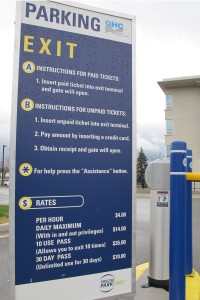Quinte Health Care says parking fees at hospitals a good thing
By Marc Venema

A recent editorial in the Canadian Medical Association Journal suggesting hospital's scrap parking fees has sparked national debate. Parking fees at Belleville General Hospital range from $4 an hour to $70 a month. Photo by Marc Venema.
Quinte Health Care says parking revenue at their hospitals is crucial despite a national debate over hospital parking fees.
Susan Rowe, director of communications at Quinte Health Care, said the $1.2 million in revenue that parking brings in to their sites annually would be hard to replace.
An editorial in the latest Canadian Medical Association Journal calling for hospital parking fees to be scrapped has started much debate across the country, as well as the Quinte area, but Rowe says parking revenues are very important to the hospital.
“We rely on those parking revenues,” Rowe said.
Rajendra Kale, editor-in-chief with CMAJ suggested Canada do away with parking fees at hospitals in the editorial.
“Parking fees are a barrier to health care and add avoidable stress to patients who enough to deal with,” Kale said.
Visitors in the parking lot at Belleville General Hospital agree with Kale’s view.
June Williams, a Belleville resident says being a regular to the hospital can drain the bank account.
“I think it’s ridiculous,” Williams said.
“I am bringing my husband here for therapy and I have to pay to park, when I come back this afternoon, I have to pay to park, it really ticks me off”.
The price to park at Quinte Health Care sites is $4 an hour, $14 daily, $35 for a 10-use pass and $70 for a monthly pass.
Kathy Felkar, a Prince Edward County native says she understands that the money has to come from somewhere but believes it’s coming from the wrong places.
“People that come here are distraught and stressed, I think they are asking the wrong people at the wrong time” Felkar said.
“You’re taking the most vulnerable people and asking them to fork out money and that’s wrong.”
Rowe says 72 percent of QHC’s revenues come from the Ministry of Health; the rest must come from somewhere else.
“We receive $1.2 million a year in revenue at QHC from parking revenue alone.”
The total revenue annually at QHC is $177 million, making the parking revenue less than one percent.
Rowe said that one percent is important in funding staff and services. Without that revenue, Rowe says the money would have to come from somewhere else.
Rowe also suggests that free parking would cause a lot of problems.
“If we had free parking, we would not have enough spots for people when they really needed them,” Rowe said.
She says free parking would end up with the parking lots filled up very quickly.
“The lots would be full and it would be difficult for people who need too park too do that.”
 Print This Post
Print This Post






